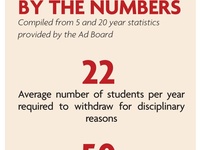A major driving force behind the recommendation was the Committee’s realization that withdrawal may be an excessive response in many cases, Sundquist says.
The report, which only addresses academic dishonesty policy, will not affect cases of forced withdrawal due to poor academic performance, as in Jeff’s case.
Though the Committee agreed that a requirement to withdraw can prove beneficial for some students, they felt that withdrawal may not constitute an “appropriate” response to most cases of academic dishonesty, according to Committee member Donald H. Pfister, professor of systematic botany.
“We felt there could be an educational moment [in many academic dishonesty cases] that right now wasn’t being realized,” Sundquist says. “If there are more different responses, we think there will be a lot fewer required withdrawals.”
A LACK OF SUPPORT
Thought the Committee’s recommendations may address the issue of matching incidents of academic dishonesty with the appropriate disciplinary response, the proposals are not a panacea for many of the difficulties experienced by students who do have to withdraw.
Anna says that the lack of support from the College during her recent withdrawal has led her to feel “completely discarded” by Harvard.
Anna had been seeing mental health therapists and receiving prescription medication from University Health Services, and says that she did not realize she would lose her health insurance through Harvard until she had only two days left of coverage.
However, the loss of insurance is a state-mandated law, according to Ellison.
“Our UHS staff help find students providers in the area and try to make certain the transition is smooth,” he says.
But Anna says UHS did not have readily available information to help her find an alternative health plan, and she left campus without the medication that she considers “vital” to her well-being. As of now, Anna is still uninsured.
“I’ve spent the most of these past three weeks struggling with [drug] withdrawal symptoms,” she wrote in an e-mail to her resident dean in February. “It seemed that the University went from caring whether I was chronically depressed or had any intentions of hurting myself to not giving a damn what happened to me now that I was on my own.”
Anna, who also addressed her suicidal thoughts in the e-mail, says she never received a response from her resident dean.
Indeed, some students complain that withdrawal cuts them off too severely from the College’s resources and campus life itself.
Students required to withdraw are supposed to have limited contact with the College during their time away, as “part of the goal is separation and reevaluation for the student,” Ellison says. “We do let the student know that we have every intention of having him or her return to finish.”
Read more in News
Rapper Kid Cudi To Perform At YardfestRecommended Articles
-
Eliot House Masters To Step Down in JuneAfter a decade as Eliot House Masters, Lino Pertile and Anna Bensted announced they would step down this June in a Thanksgiving e-mail to the House's listserv.
-
 The Quad ATM Has Arrived
The Quad ATM Has Arrived -
 J-Term Journal: Fading to Black (Swan)
J-Term Journal: Fading to Black (Swan) -
 Fresh ‘Like Crazy’ Offers Realistic Romance
Fresh ‘Like Crazy’ Offers Realistic Romance -
 Fighting Pain with Pain
Fighting Pain with Pain -
 Love & Earl Grey
Love & Earl Grey














